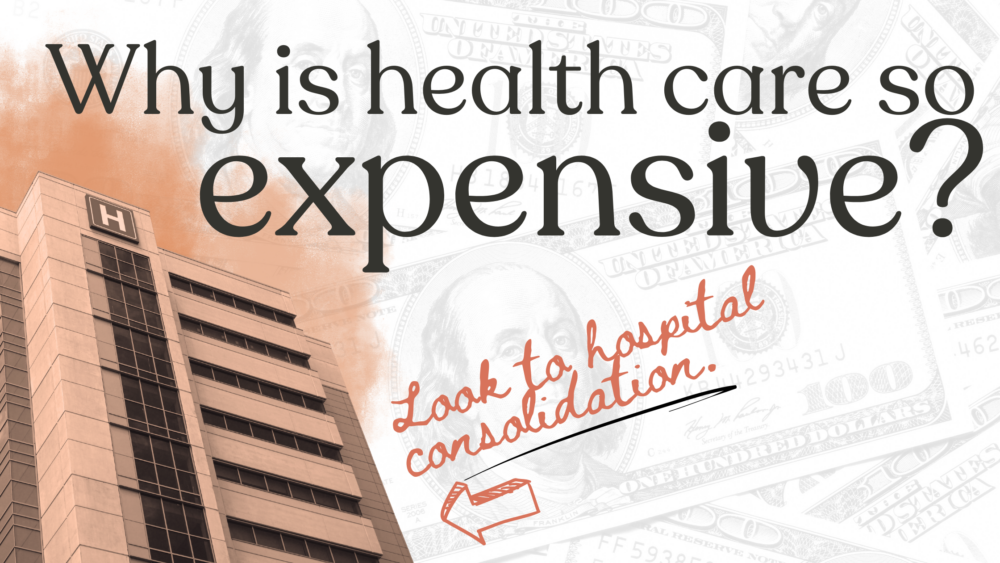
Washington residents know that the only thing worse than needing medical care is the fight to get it – and pay for it. And thanks to unchecked greed and unregulated hospital consolidations, these problems are only growing.
The Washington State Legislature is taking this issue on this session as it considers a bill to better regulate health care and hospital consolidations. The Keep Our Care Act (SB 5241, also known as KOCA) would give the attorney general oversight over potential consolidations – and the power to stop them or place conditions on them if they would be shown to reduce access to care or increase costs for patients.
Hospital consolidation: A big part of a much bigger issue
Medical debt is now the number one reason for bankruptcy in the United States. Insurance premiums and out-of-pocket costs increase every year. Patients forego needed treatments and medicines because, even when they’re insured through their jobs or on the exchange, they can’t afford these necessities.
Meanwhile, hulking hospital systems are allowed to operate like corporations, rather than care providers. In order to appease investors and already-wealthy shareholders, hospital conglomerates copy their Wall Street brethren. Even Amazon has seen the financial potential of this real-life monopoly game and is seeking its own share of the profit with its Amazon Health programs.
But of course, health care isn’t a typical consumer market. And for too long, we’ve allowed it to play by the same rules.
As long as we treat health care as a business, consumers will continue to pay the price – in every sense of the word.
Hospital consolidation, just like consolidations in other industries, takes place when a company acquires, merges, or affiliates with another. It can happen either horizontally, when a company acquires or merges with its competitors, or vertically, when a company acquires companies up and down the supply chain. But unlike mergers in other industries – which may result in layoffs, downsizing, and the closure of services – hospital consolidations may literally cost patients their lives.
When hospitals merge, patients may see reduced access to very specific kinds of care, like in the case of restricted access to abortion care following a faith-based hospital monopolizing a rural area. In fact, 48% of all hospital beds in Washington were religiously affiliated as of February 2023.
Decades of research leaves no room for debate: consolidation is at the root of high health care prices. Why? When fewer companies own a larger share of our health care market, hospital corporations can monopolize the market and drown out the competition. Without sufficient regulations, companies can assert more market power to raise prices without improving quality or access for patients.
In short, years of laissez-faire, pro-corporation, artificial “free market” economic policy have left us with a rapidly consolidating health care system that leaves patients with fewer choices and higher prices.

Assessing the impact of hospital consolidation
Here in our state, consolidations have skyrocketed in recent decades. A study conducted by Washington’s Office of Financial Management in 2022 found that the percentage of Washington hospitals in systems grew from just 10% in 1986 to nearly 50% in 2017.
Just eight health systems now control 90% of the licensed hospital beds in our state.
Every year, health insurers, corporations, and even private equity investors are buying up more of the market. In addition to increasing prices and wait times, hospital consolidation also poses real risk to marginalized individuals.
As faith-based hospitals own a larger share of our market, access to critical services is at risk – services like abortion care, gender-affirming care, and end-of-life care. Providence, the largest health care provider in Washington, can legally deny patients these important services; faith-based entities are, by law, granted the freedom to deny care based on religious protocols. Access becomes especially limited in rural areas, where a faith-based hospital may be the only hospital within a several hour drive.
The Keep Our Care Act is a solution
Our lawmakers know that we need to stop letting hospitals behave like Fortune 500 companies. In 2017, Washington’s Attorney General sued CHI Franciscan because the hospital system’s consolidation resulted in increased costs for patients, larger profit margins for the hospital, and decreased market competition. But this suit came too late; patients had already lost.
We need a review process before harmful consolidations get approved – and we need oversight after the fact to address harmful impacts.
Addressing hospital consolidation is key to improving health care affordability and access. This is why KOCA is at the top of EOI’s priority list. The Keep Our Care Act doesn’t stop beneficial consolidations from moving forward, but it does put a check on transactions that would reduce access or increase prices.
Another bill (HB 2066) would have addressed anti-competitive provider contracting – a common consequence of an overly consolidated market. Unfortunately, this bill has failed to move forward due to immense industry opposition.
Take action NOW! Ask your state reps to pass KOCA
The Keep Our Care Act, meanwhile, is still in motion, passing the Senate with bipartisan support on February 8th and the House Civil Rights and Judiciary Committee on February 20th. At of the time of publication, the bill is moving through the process in the House. And it’s not a minute too soon.
Health care is not like tech or consumer goods. It’s not an area where most “customers” have a lot of choice or options. We can’t continue to let hospitals act like tech giants – until we put a stop to harmful consolidations, our health care system will continue to be bought and sold like a commodity.
More To Read
February 11, 2025
The rising cost of health care is unsustainable and out of control
We have solutions that put people over profits
January 29, 2025
Who is left out of the Paid Family and Medical Leave Act?
Strengthening job protections gives all workers time they need to care for themselves and their families
November 1, 2024
Accessible, affordable health care must be protected
Washington’s elected leaders can further expand essential health care
